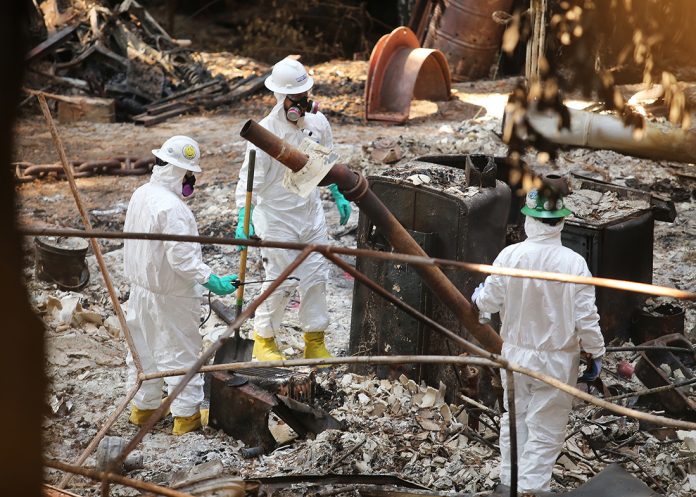
BOULDER CREEK—Several small teams of federal workers—many members wearing hazardous materials outfits—were in a small neighborhood tucked in the Santa Cruz Mountains north of Boulder Creek Monday, removing dangerous materials from sites where fire razed houses to the ground.
The work by the Environmental Protection Agency (EPA) is being coordinated by the Federal Emergency Management Agency at the behest of Santa Cruz County officials.
Such coordinated response to mass disasters typically comes in the wake of large-scale disasters such as the CZU August Lightning Complex fires, when state or federal leaders declare states of emergency. That is according to EPA Federal On-Scene Coordinator Jeremy Johnstone, who is overseeing two teams tasked with identifying and removing hazardous materials at the hundreds of destroyed homes in Santa Cruz County.
The work began Sept. 29, and could last as long as eight weeks, said EPA Section Manager Rusty Harris-Bishop.
The Phase 1 work begins with workers finding and removing such hazards as high or low levels of oxygen, carbon monoxide, hydrogen sulfide, pesticide and explosives such as ammunition.
They also find and remove materials containing asbestos, and tanks filled with compressed gasses, Johnstone said.
The trouble, according to Harris-Bishop, is the sheer scale of the disaster. With more than 1,000 homes in Santa Cruz, Monterey and San Mateo counties destroyed by the fires, local landfills and hazardous material drop-off centers would be quickly overwhelmed if homeowners did the removal work themselves.
“That’s when we get involved—when the impact is to hundreds of homes,” he said.
For phase 2, workers will remove the remaining materials, so that rebuilding can begin, Harris-Bishop said.
“We are here to remove those hazards so that the next phase of workers can come in and not be exposed to those, and they don’t go into the environment,” he said.











